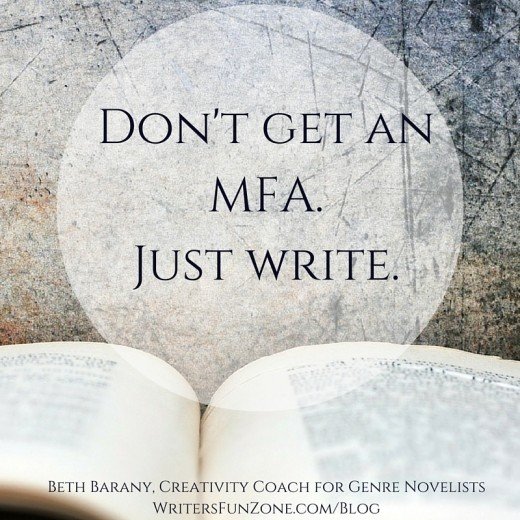Ready to Quit? Five Steps to Do It Right by Margaret A. Nystrom, M.A.T.
 Welcome back educator, writer, and artist Margaret Aslanis-Nystrom who shares with us tips to keep writing when we feel tempted to quit. Enjoy!
Welcome back educator, writer, and artist Margaret Aslanis-Nystrom who shares with us tips to keep writing when we feel tempted to quit. Enjoy!
***
Are you tempted to quit writing?
Here are five steps to help get your mojo back, or to quit without the guilt.
1. First, take a step back. Take a little break. Just breathe. It’s not the end of the world. Yes, you have important decisions to make. Quit, or not? But before you make those decisions, complete the following steps.
2. It’s time for a little appreciation. A little pat on the back for what you have done already. Look objectively at how far you have come, instead of how far you have to go. It doesn’t matter how little your word count currently is, or how few chapters you have. What matters? You have accomplished SOMETHING, and you should recognize that, no matter how little you think it is. Are you proud of a particular character or plot you created?
Has your vocabulary increased? Are your grammar skills enviable? Do you have this one terrific sentence or powerful paragraph? Have you gotten interested in a completely new genre for you? Are your reading comprehension skills better? Sometimes, it only takes a little look back at some of your accomplishments to help you carry on your work with new enthusiasm and determination. As a writer, you have to be your own best cheerleader.
3. A Quitting Plan: Write down a plan for quitting. That’s right, a plan for what you will do if you decide to quit. What would you do and feel if you decided to quit? Is it worth it to you? What will you miss if you do quit? What will you miss, if you don’t quit? Will your life be enriched or more meaningful? Write down your answers to these questions. This is not a time to berate yourself, or feel guilty. This is a time of reflection and evaluation.
A time to figure out what you need, if you decide to quit. Give yourself permission to stop if you need to do so. Quitting does not need to be an ‘all or nothing’ option. You can quit in spurts. It may just give you the time you need to rest, refocus, and get back to writing, if you give yourself permission to quit in small amounts. Write down what you need for the future so you have something to turn to the next time you find yourself in trouble.
4. A Not-Quitting Plan: Write down a plan for NOT quitting. That’s right, you need something in place to help you from quitting. Don’t go cold turkey. Figure out the things you need to keep you going. What are the time-wasters in your life? What motivates or inspires you? Let people know you need their help in motivating you. Give yourself permission to keep going when the going is tough. Remember the excitement you felt before a new project?
Try to capture that energy. Write what works and put them into a special place you can go to when you need the motivation to keep writing. Be prepared for rejection and the feelings that accompany that. Never compare yourself to other writers! This is a sure way to get depressed! These ideas should be part of your writer business plan. Yes, writing is your business. No writer should write without a plan.
5. Finally, give yourself time to think without any pressure. Don’t rush to judgment, especially if you are upset. Give yourself a time frame. “I will stop writing for two weeks, and then decide if it is something I want to continue to do or not”. Then during those two weeks do everything else you like to do besides writing. Get active.
Use you body and give your brain a rest. Have some fun! Read author biographies/autobiographies about inspiring authors who struggled to write. Read a totally different genre you have never tried before. Just explore with no goal in mind except to relax and refresh yourself. Talk to other writers who have gone through rough times, or go to a writer’s conference/workshop.
So your time period of two weeks is up. It’s time to decide. Whatever you decide, learn to live with it. This may not be the right time in your life. Give yourself permission to change your mind if and when the right time comes. Give yourself permission to be sad for your loss.
Writing is not for everyone. It takes strength to recognize it and live with it. At the very least, you tried to be a writer and now you are free to find something else that suits you better.
But before you pack away your pens and laptop, ask yourself ONE question. Are you a writer because you can’t NOT write? The answer to that question can help you make your final decision.
Related articles:
http://www.thereviewreview.net/publishing-tips/quitting-writing-i-cant-go-ill-go
http://simner.com/blog/?p=5654
http://cathylamb.org/2013/02/on-quitting-writing/
***
ABOUT THE AUTHOR
 Margaret A. Nystrom, M.A.T., Q.M.H.P. Feeling stuck or need help with procrastination or writer’s block? Margaret’s award-winning blog, http://afterwriterdreams.com/, is a motivational content blog for writers. She is an author, educator, artist, and monthly guest blogger/columnist in N.C. She has taught children and adults for 40 years and created over 25 blogs. She also writes articles and psychological thrillers. Read her new ebook: The Writer’s Control Guide for Procrastination and Writer’s Block: 101 Management Strategies.
Margaret A. Nystrom, M.A.T., Q.M.H.P. Feeling stuck or need help with procrastination or writer’s block? Margaret’s award-winning blog, http://afterwriterdreams.com/, is a motivational content blog for writers. She is an author, educator, artist, and monthly guest blogger/columnist in N.C. She has taught children and adults for 40 years and created over 25 blogs. She also writes articles and psychological thrillers. Read her new ebook: The Writer’s Control Guide for Procrastination and Writer’s Block: 101 Management Strategies.






